Colon & Rectal Surgery
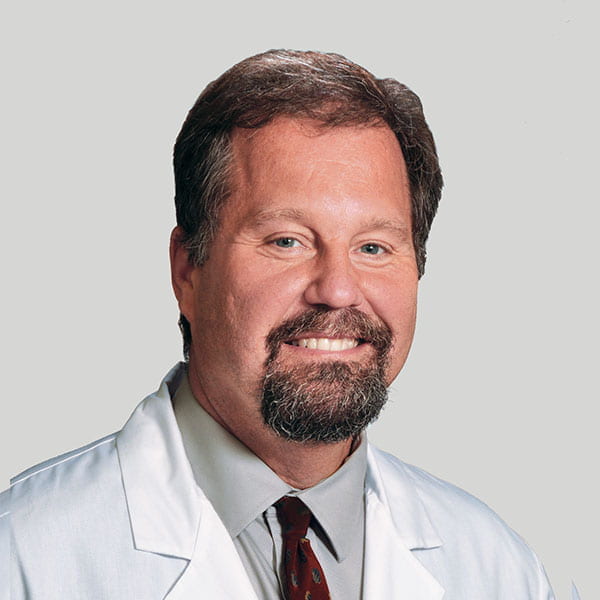
Neil H. Hyman, MD
Professor of Surgery
Chief, Section of Colon & Rectal Surgery
Co-Director, Digestive Diseases Center
Learn More & Contact
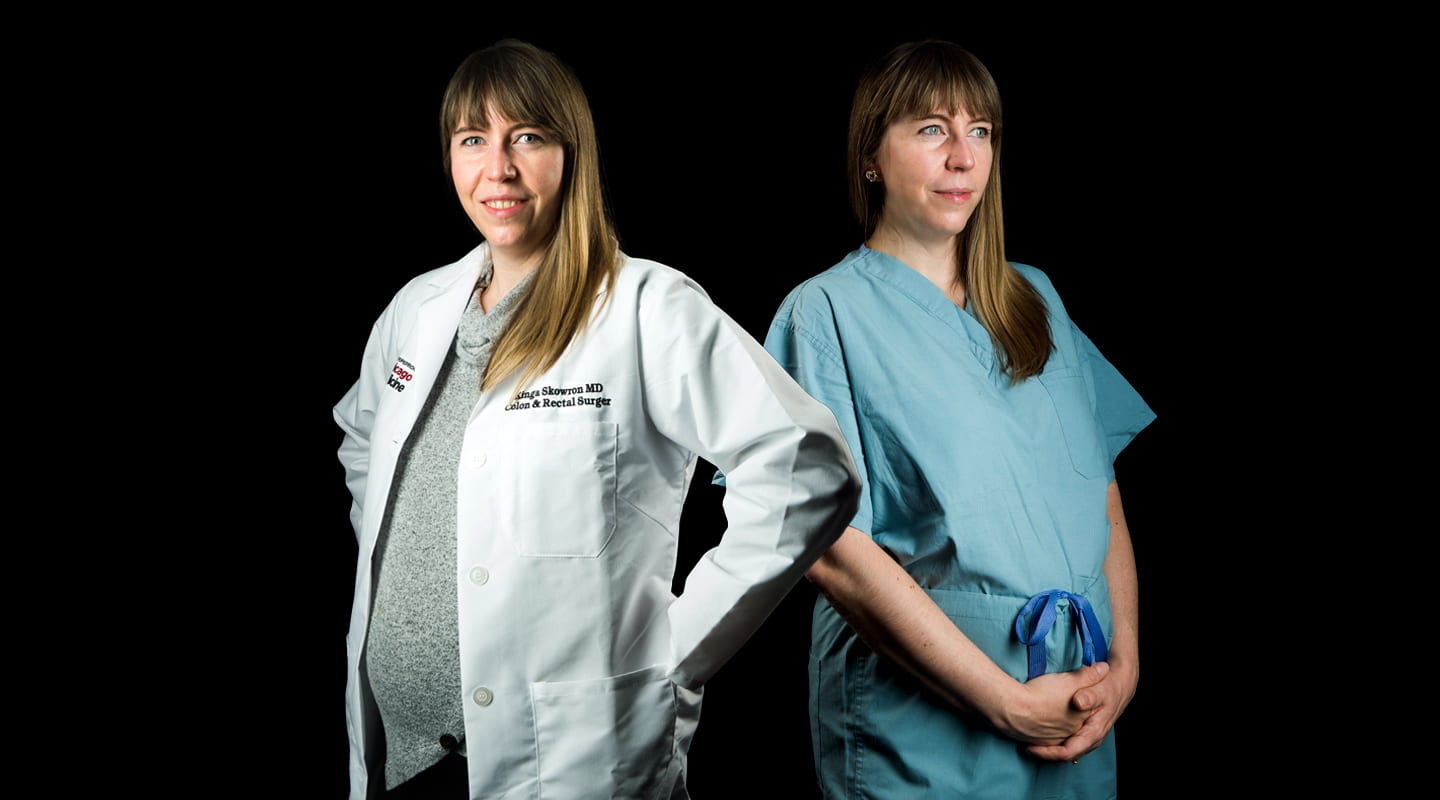
Kinga Skowron Olortegui, MD, specializes in colon and rectal surgery. She is highly skilled in treating inflammatory bowel disease (IBD), as well as colon, rectal and anal cancer, and such benign diseases as diverticulitis, hemorrhoids, fissures, abscesses and fistulas. Dr. Skowron Olortegui performs minimally invasive surgery (such as laparoscopy or robotic surgery) to minimize postoperative pain and is committed to offering each patient a custom-made treatment plan.
Making the Uncomfortable Comfortable:
Dr. Kinga Skowron Olortegui’s Hospitable Approach to Colon and Rectal Surgery
Awestruck by the phoenix
Dr. Skowron Olortegui was born in Poland and moved to the United States with her parents when she was just eight years old. She and her family settled in Hampshire, a small town just outside Chicago. “It was a very peaceful life out there,” she said. “You know, there were more farmers in my school than anyone else.”
It was through conversations with her father that she discovered the University of Chicago, as he hailed it as a magical place where only the brightest and most brilliant minds came together. It clearly made an impression on her, as her wonderment grew enormously; she excitedly leapt into a dreamy state. She couldn’t help but envision herself making her way through the entrance to the Main Quadrangle, enraptured by the smell of ivy and timeworn books beneath the gaze of the haunting (yet charming) gargoyles; Dr. Skowron Olortegui found the University alluring. When it came time for college, she applied to the University’s undergraduate College. “I applied early decision, because I thought to myself if I could get in there, I’m not going to go anywhere else,” she said. “I was applying to other schools in the meantime, but when I got in, I withdrew all my other applications; I was sold immediately.”
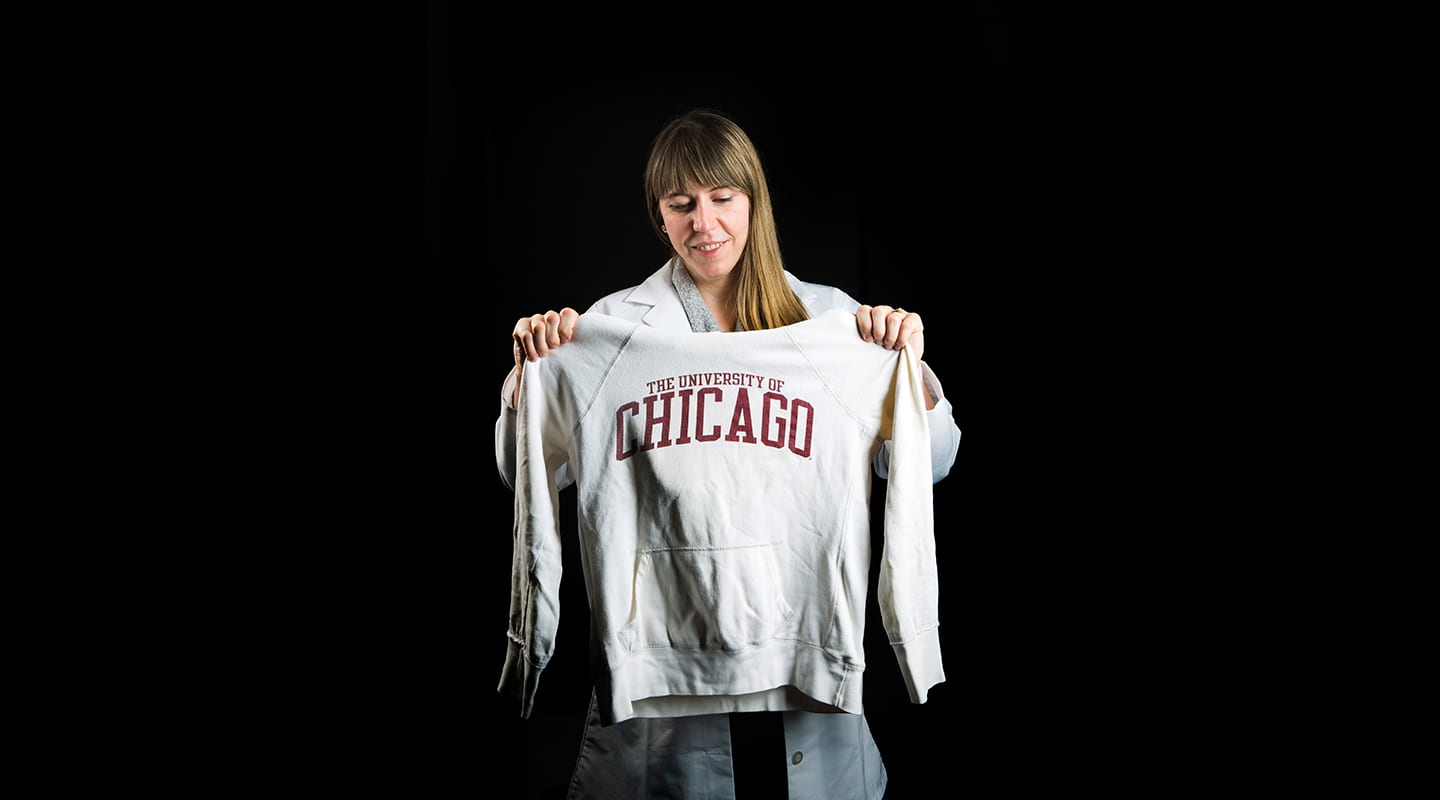
The University of Chicago allows minds to flourish and explore the unknown. Brows furrow and hands ascend fervently as diverse and full-bodied discussions echo throughout the halls of Cobb Hall, continuing onto the Main Quad and into Hutchinson Commons. Like many “lifers” at the University, Dr. Skowron Olortegui was immediately taken with the University and could never really see herself leaving. Which is why in her fourth year at the College she applied to the Pritzker School of Medicine’s Accelerated Medical Scholars Program—which resulted in her fourth year of undergraduate study overlapping with her first year of medical school.
She didn’t know she would go into surgery until she was on rotations in medical school. “I honestly thought I was going to do pediatrics, but there was something about surgery that just blended so well with my personality,” she said.
Not only was Dr. Skowron Olortegui passionate about learning, like many members of this intellectual community, but she enjoyed the immediate aspect of helping someone with an intervention. She did her fourth-year rotation with the colorectal team, under the direction of world-renowned colorectal surgeons: Professor of Surgery Roger D. Hurst, MD, and Associate Professor of Surgery Konstantin Umanskiy, MD. “It was a whirlwind, but it was amazing,” she said. “I fell in love with the department here.”
Dr. Skowron Olortegui’s dedication to the University and its Department of Surgery is solid. From the moment her parents planted the kernel of possibility when she was a child, she nurtured her dream and cultivated her destiny; she now dwells in the land that once seemed like a far-fetched utopia.
“So it’s become my second home basically,” she said. “In fact, I’ve probably spent more time at the University of Chicago than anywhere else; I’ve never left, because I just love this place so much.”

Being hospitable in the hospital
One of the things that Dr. Skowron Olortegui takes pride in is her ability to make an uncomfortable and scary experience less so for patients. She consistently reminds them that colon and rectal care and surgery is her specialty, and that she is there to help them. She reassures her patients by telling them, “You’re among friends; you know you can relax here.” Many of her patients are simply embarrassed by the nature of their medical conditions, which often leads to concealment. It’s not uncommon for patients to wait to seek medical treatment until it has become unbearable, and so Dr. Skowron Olortegui’s goal is to help them understand that their condition is nothing to be embarrassed about and that she is there to help.
The UChicago Medicine colorectal team encompasses a team of expert clinicians who create a supportive and empathetic atmosphere for patients. “It’s just a matter of encouraging them to seek help, because these things may seem embarrassing,” said Dr. Skowron Olortegui. “It’s a part of the human experience, but when you’re living it and you’ve never had this happen to you before, it can seem so scary and so foreign.”
Both kindness and grace profoundly ring true with the concept of holistic care. Dr. Skowron Olortegui always tries to create an exultant environment for her patients, as many of them have been suffering in silence for extended periods of time. “When their chart says that they’ve had this for months or that they couldn’t get in to see a doctor until now, usually I say I’m so sorry that we’re meeting like this. You must have been suffering for a long time,” she said. “I learned this from Chief of Colon & Rectal Surgery Neil H. Hyman, MD, because he’s so good with patients.” She listens to each of her patients absorbedly and levels with them to get a comprehensive understanding of where they are, physically and mentally. “For some of the IBD patients, they might be feeling that having to explain their story again to another doctor is daunting,” said Dr. Skowron Olortegui. “I’ll just want them to know that it’s OK to get comfortable, tell me what’s bothering them and what’s hurting them.”
Earlier this year, a concerned mother reached out to David T. Rubin, MD, Joseph B. Kirsner Professor of Medicine and a renowned gastroenterologist at the University of Chicago Medicine, and explained that her son had a pilonidal cyst and was experiencing a substantial amount of pain. A pilonidal cyst is an abnormal pocket in the skin that typically contains hair and skin debris. If a pilonidal cyst becomes infected, the resulting abscess is often unbearably painful.
“I have conversations with patients about whether or not we should completely excise the cyst, because that procedure can be really painful,” said Dr. Skowron Olortegui. “It can cause some wound issues, and so I usually let the patient decide when they feel like it’s time. So for someone who’s had an infection just once, we can try some strategies to reduce the chances of it getting infected again. If those things don’t work and they keep getting these painful infections, then certainly I recommend to remove the cyst.”
Without hesitation, Dr. Rubin recommended Dr. Skowron Olortegui. Instead of the patient having to wait weeks for relief, Dr. Skowron Olortegui was able to perform an office procedure that provided instantaneous relief. “I did an office incision procedure where I opened the cyst and allowed the infection to drain out; that provides basically instant relief, because that pressure and the pain from the infection are drained,” she said. The patient, as well as his mother, could not have been more pleased with the kind and thoughtful care he received. As difficult as the pain from the cyst had been, this patient also suffered from severe depression and anxiety. In this instance, Dr. Skowron Olortegui’s sensitivity was as important as her surgical skill.
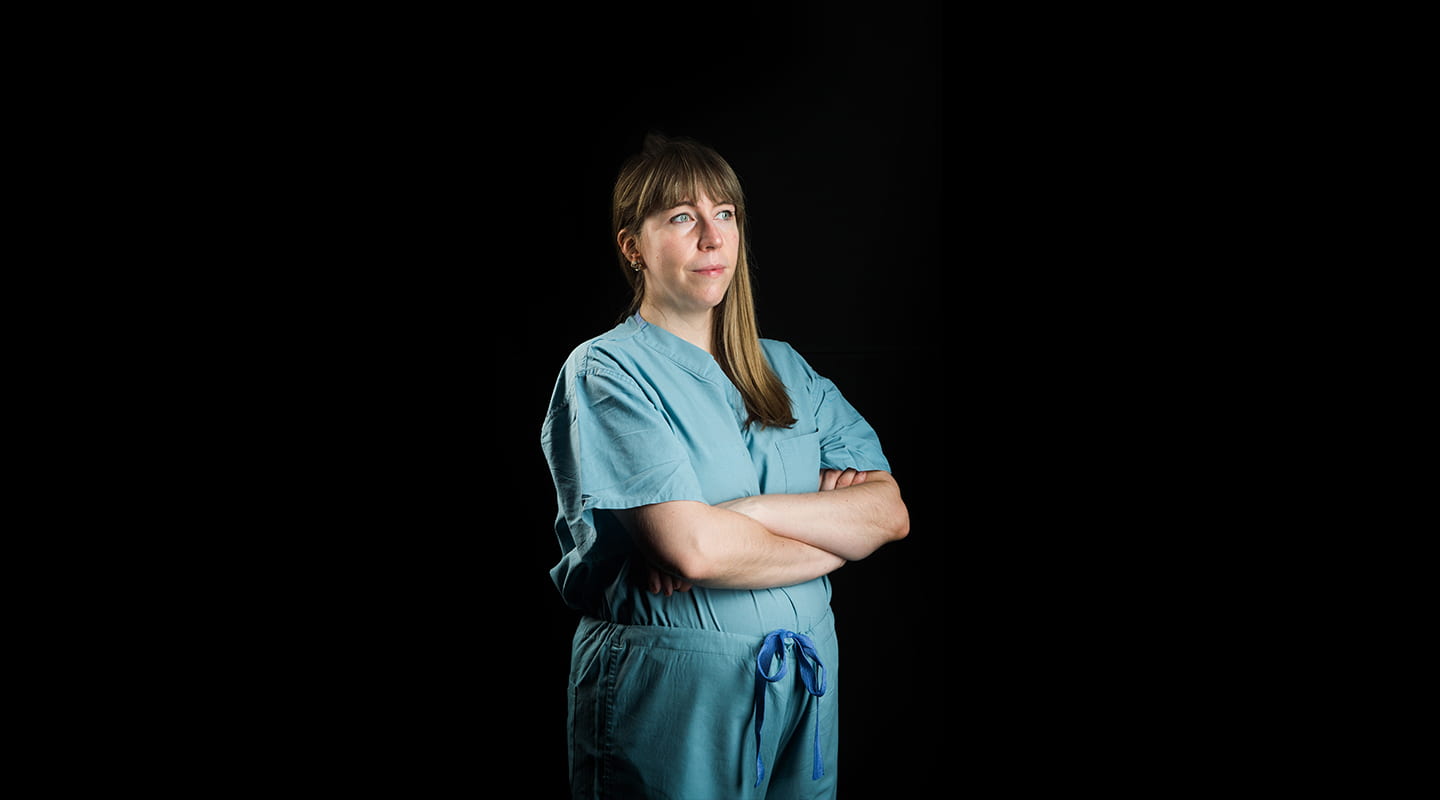
The defining moments
It was on a Friday, in the wee hours of the morning, when Dr. Skowron Olortegui received a call about a patient who had perforated diverticulitis and was about to code in the emergency room. She hastily made her way to the operating room. The patient’s intestine was scarred profusely. “She was so sick that I remember having lots of moments where I would pause and talk to the anesthesiologists, because the best operation for her seemed like it might not be possible,” said Dr. Skowron Olortegui.
There are various “bailout” procedures a surgeon could have pursued, such as cleaning the infection and sending the patient to the ICU in order to come back the next day, but she remained steadfast—determined to perform the operation. Amid a vortex of incredible pressure, Dr. Skowron Olortegui kept working and the patient not only stabilized, but improved.
“Ultimately, I did the intended operation for her, which was a resection of the colon and an end colostomy,” said Dr. Skowron Olortegui. “The patient was pretty sick for a few weeks in the hospital recovering from that, but actually she was my very first case, and she came to her post-op appointment with two dozen roses for me.” Dr. Skowron Olortegui never expected the gesture, but it reaffirmed her strong commitment to the well-being of her patients and the surgical path she had chosen.
Kinga Skowron Olortegui, MD
Assistant Professor of Surgery
Her inspiring and meaningful actions that day embody the spirit of our surgical team—an inexorable pursuit to provide the finest care possible.
Improving J-pouch outcomes
In addition to her work in the operating room, Dr. Skowron Olortegui is dedicated to her research and passionate about finding ways to improve surgical outcomes. During her residency, she worked alongside Dr. Umanskiy to build a database of experiences of patients with J-pouches. A J-pouch is a reconstructive procedure after colon resection, mainly for ulcerative colitis. It is made using a loop of small intestine, which is connected to the top of the anal canal to allow for the expulsion of stool. “When we looked at that data, we saw some interesting trends,” she said. “A lot of our patients were ultimately losing their pouch, and we looked back at the various reasons for that. So many patients have a telling background, but we don’t really know what their actual outcomes are, and I think that’s a big gap in our knowledge.”
Dr. Skowron Olortegui recently received Institutional Review Board approval for this research. She is planning to build a database of all the Colon & Rectal Surgery patients so that her team can more easily study their own outcomes—examining what’s working well and where they can optimize their practice to improve patient care.
The Department of Surgery is composed of a team of innovative leaders like Dr. Skowron Olortegui who are—through explorative research—always striving to improve the quality of life for patients and provide a more promising future for them.
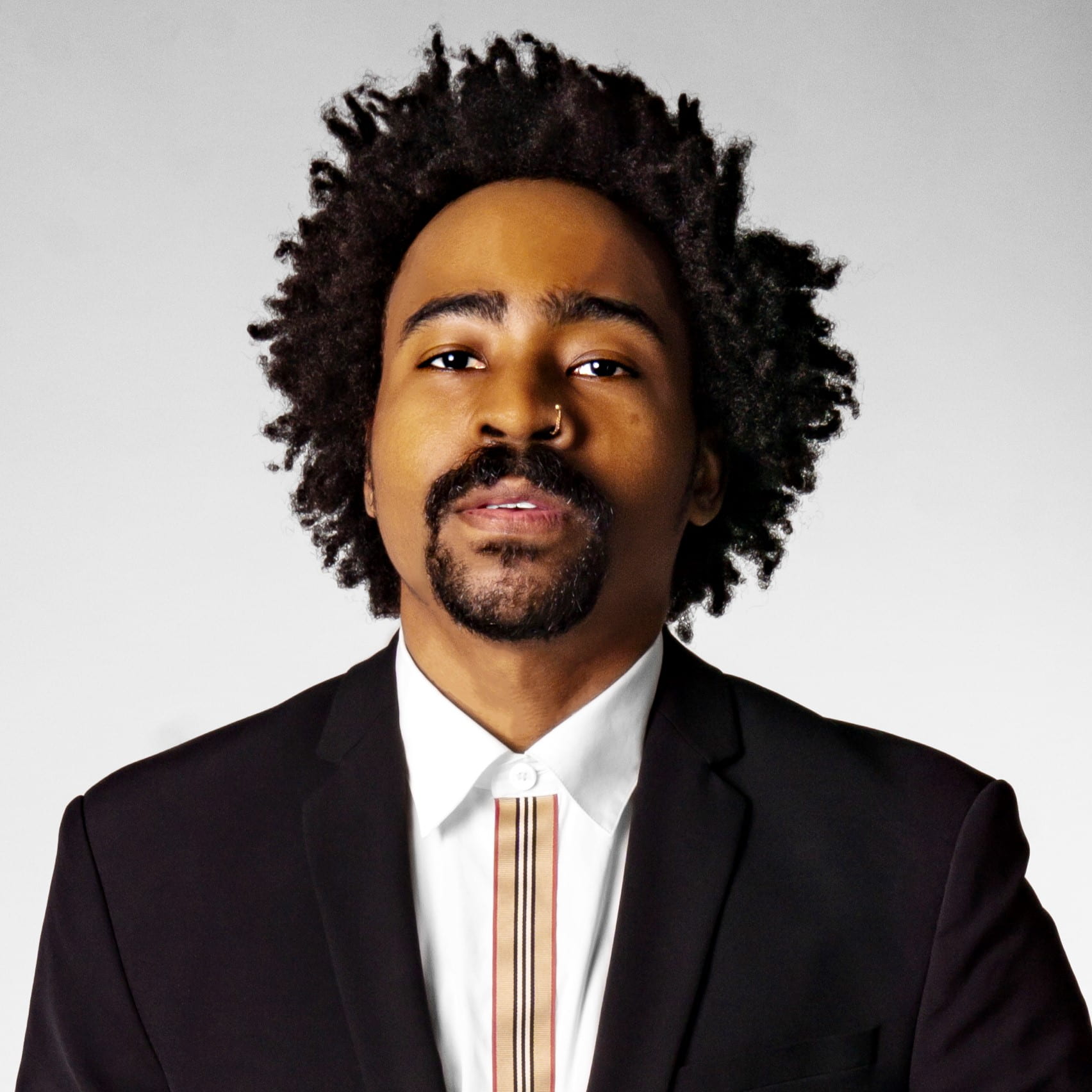
Julian T. Owens
Department of Surgery Core Operations Manager
The University of Chicago Medicine
faculty listing
Professor of Surgery
Roger D. Hurst, MD, Professor of Surgery
Neil H. Hyman, MD, Professor of Surgery; Chief, Section of Colon and Rectal Surgery; Co-Director, Digestive Diseases Center
Associate Professor of Surgery
Konstantin Umanskiy, MD, Associate Professor of Surgery; Program Director, Colon and Rectal Surgery Residency Program
Assistant Professor of Surgery
Benjamin Shogan, MD, Assistant Professor of Surgery
Kinga Skowron Olortegui, MD, Assistant Professor of Surgery
faculty honors
Benjamin Shogan, MD, was awarded an NIH/SBIR grant for “Characterization of the effect of an ECM based adhesion barrier on the healing of bowel anastomosis.” He was voted a faculty member of AOA by medical students. He received a K08 grant for his project “Elucidating the role and mechanisms by which collagenase producing intestinal bacteria promote colorectal cancer recurrence and metastasis following surgery.” Dr. Shogan won a Bucksbaum Institute Junior Faculty Scholar award, received the Doroghazi Outstanding Clinical Teaching Award from the Pritzker Class of 2021, and received the Robert Baker Golden Apple Teaching Award.
Kinga Skowron Olortegui, MD, received a grant from the Crohn’s & Colitis Foundation to participate in the IBD Surgical Innovation, Research and Quality Collaborative. She received a GIRF grant to support her master’s in outcomes research and data analysis at the University of Chicago. She was promoted to Assistant Professor of Surgery and completed a master’s degree in Public Health Sciences at the University of Chicago.
Konstantin Umanskiy, MD, completed a term as Program Director for the American Society of Colon and Rectal Surgeons Annual Meeting. He was named Program Director of the 2021 American Society of Colon and Rectal Surgeons Annual Meeting.
Faculty Promotions
Kinga Skowron Olortegui, MD, Clinical Associate to Assistant Professor, effective July 1, 2021
select publications
Yamada A, Komaki Y, Komaki F, Haider H, Micic D, Pekow J, Dalal S, Cohen RD, Cannon L, Umanskiy K, Smith R, Shogan BD, Hurst R, Hyman N, Rubin DT, Sakuraba A. The correlation between vitamin D levels and the risk of postoperative recurrence in Crohn’s disease. Digestion. 2021; 8:1-9.
Twohig K, Ajith A, Mayampurath A, Hyman N, Shogan B. Abnormal vital signs after laparoscopic colorectal surgery: More common than you think. Am J Surg, 2021; 221(3):654-658.
Hyman N, Umanskiy K. Chapter 53: Anus. In Townsend CM ed. Sabiston Textbook of Surgery: The Biological Basis for Surgical Practice. 21st edition, Elsevier, Philadelphia, 2021; Chapter 53: pp 1401-1424.
Guyton K, Belogortseva N, Levine Z, Kaiser B, Sangwan N, Hyman N, Shogan B, Zaborina O, Alverdy J. Patient acceptance of routine serial postoperative endoscopy following low anterior resection (LAR) and its ability to detect biomarkers in anastomotic lavage fluid. World J Surg 2021; 45:2227-2234.
Cavallaro PM, Vogler SA, Hyman NH, Ky AJ, Savitt LR, Tyler KM, Gurland BH, Bordeianou L. Preliminary report from the pelvic floor disorders consortium: Large scale data collection through quality improvement initiatives to provide data on functional outcomes following rectal prolapse repair. Dis Colon Rectum 2021;64:986-994.
Stoy J, Greeley SAW, Paz VP, Ye H, Pastore AN, Skowron KB, Lipton RB, Cogen FR, Bell GI, Philipson LH, United States Neonatal Diabetes Working Group. 2008. Diagnosis and treatment of neonatal diabetes: an United States experience. Pediatric Diabetes 9(5): 450-459.
Greeley SAW, Tucker SE, Worrell HI, Skowron KB, Bell GI, Philipson LH. 2010. Update in neonatal diabetes. Current Opinion in Endocrinology, Diabetes & Obesity (1): 13-19.
Skowron KB, Lapin B, Rubin M, Hurst RD, Rubin DT, Hyman NH, Umanskiy K. 2016. Clostridium Difficile Infection in Ulcerative Colitis: Can Alteration of the Gut-associated Microbiome Contribute to Pouch Failure? Inflammatory Bowel Diseases 22(4): 902-911.
Skowron KB*, Zheng W*, Namm JP*, Burnette B, Fernandez C, Arina A, Huang L, Spiotto M, Posner MC, Fu YX, Weichselbaum RR. 2016. Combination of Radiotherapy and Vaccination Overcomes Checkpoint Blockade Resistance. Oncotarget 7(28): 43049-43051. *Authors contributed equally.
Skowron KB*, Pitroda S*, Namm JP, Balogun O, Becket MA, Zenner M, Fayanju O, Huang X, Fernandez C, Zhang W, Qiao G, Chin R, Kron, SJ, Khodarev N, Posner MC, Steinberg GD, Weichselbaum RR. 2016. Basal Tumor Cell Isolation and Patient-Derived Xenograft Engraftment Identify High-Risk Clinical Bladder Cancers. Scientific Reports 6: 35854. *Authors contributed equally.
Oshima G, Stack ME, Wightman SC, Bryan D, Poli E, Xue L, Skowron KB, Uppal A, Pitroda SP, Huang X, Posner MC, Hellman S, Weichselbaum RR, Khodarev NN. 2016. Advanced Animal Model of Colorectal Metastasis in Liver: Imaging Techniques and Properties of Metastatic Clones. Journal of Visualized Experiments 117.
Skowron KB, Angelos P. 2017. Surgical Informed Consent: Time to Revise the Routine? World Journal of Surgery 41(1): 1-4.
Oshima G, Guo N, He C, Stack ME, Poon C, Uppal A, Wightman SC, Parekh A, Skowron KB, Posner MC, Lin W, Khodarev NN, Weichselbaum RR. 2017. In Vivo Delivery and Therapeutic Effects of a MicroRNA on Colorectal Liver Metastases. Molecular Therapy 25(7): 1588-1595.
Skowron KB, Shogan BD, Rubin DT, Hyman NH. 2018. The New Frontier: The Intestinal Microbiome and Surgery. Journal of Gastrointestinal Surgery 22(7): 1277-1285.
Sossenheimer PH, Glick LR, Dachman A, Skowron KB, Rubin M, Umanskiy K, Smith R, Cannon L, Hurst RD, Cohen RD, Hyman NH, Rubin DT. 2019. Abnormal Pouchogram Predicts Pouch Failure Even in Asymptomatic Patients. Diseases of the Colon & Rectum 62(4): 463-469.
Bertucci Zoccali M, Skowron KB, Rubin M, Cannon L, Hurst RD, Umanskiy K, Rubin DT, Hyman N, Shogan BD. 2019. Exposure to Anti-TNF Medications Increases the Incidence of Pouchitis After Restorative Proctocolectomy in Patients with Ulcerative Colitis. Diseases of the Colon & Rectum 62(11): 1344-1351.
Skowron KB, Hurst RD, Umanskiy K, Hyman NH, Shogan BD. 2020. Caring for Patients with Rectal Cancer During the COVID-10 Pandemic. Journal of Gastrointestinal Surgery 24: 1698-1703.
Akiyama S, Ollech JE, Rai V, Glick LR, Yi Y, Traboulsi C, Runde J, Cohen RD, Skowron KB, Hurst RD, Umanskiy K, Shogan BD, Hyman NH, Rubin MA, Dalal SR, Sakuraba A, Pekow J, Chang EB, Rubin DT. 2021. Endoscopic phenotype of the J pouch in patients with inflammatory bowel disease: A new classification for pouch outcomes. Clinical Gastroenterology and Hepatology.
Rubio GA, Hurst RD, Umanskiy K, Shogan BD, Hyman N, Skowron KB. Neoadjuvant therapy for cT2N0M0 rectal cancer? Journal of Gastrointestinal Surgery.
Skowron KB*, Krezalek M*, Guyton KL*, Shakhsheer B*, Hyoju S, Alverdy JC. 2016. The Microbiome and Surgical Disease. Current Problems in Surgery 53(6): 257-293.
Vining CC, Skowron KB, Hogg ME. 2021. Robotic Gastrointestinal Surgery: Learning Curve, Educational Programs and Outcomes. Updates in Surgery.
Long-term Results of the Side-to-side Isoperistaltic Strictureplasty in Crohn Disease: 25-year Follow-up and Outcomes. Michelassi F, Mege D, Rubin M, Hurst RD. Ann Surg. 2020 Jul;272(1):130-137. PMID: 30720502.
Low-Dose Metronidazole is Associated With a Decreased Rate of Endoscopic Recurrence of Crohn’s Disease After Ileal Resection: A Retrospective Cohort Study. Glick LR, Sossenheimer PH, Ollech JE, Cohen RD, Hyman NH, Hurst RD, Rubin DT. J Crohns Colitis. 2019 Sep 19;13(9):1158-1162. PMID: 30809655.
Outcome of elective switching to vedolizumab in inflammatory bowel disease patients under tumor necrosis factor antagonist-maintained clinical remission. Wang Y, Wang J, Pekow J, Dalal S, Cohen RD, Ollech J, Israel A, Shogan BD, Micic D, Cannon L, Umanskiy K, Hurst R, Hyman N, Rubin DT, Sakuraba A. J Gastroenterol Hepatol. 2019 Dec;34(12):2090-2095. PMID: 31169926.
A comparison of the risk of postoperative recurrence between African-American and Caucasian patients with Crohn’s disease. Anyane-Yeboa A, Yamada A, Haider H, Wang Y, Komaki Y, Komaki F, Pekow J, Dalal S, Cohen RD, Cannon L, Umanskiy K, Smith R, Hurst R, Hyman N, Rubin DT, Sakuraba A. Aliment Pharmacol Ther. 2018 Nov;48(9):933-940. PMID: 30126019.
Zhang LM, Schuitevoerder D, White MG, Feldt S, Krishnan P, Hyman N, Shogan BD. Combined mechanical and oral antibiotic bowel preparation is associated with prolonged recurrence-free survival following surgery for colorectal cancer. J Surg Oncol. 2021. Epub ahead of print. PMID 34310702.
DI Anderson, Keskey R, Ackerman MT, Zabroina O, Hyman N, Alverdy JC, Shogan BD. Enterococcus faecalis is associated with anastomotic leak in patients undergoing colorectal surgery. Surgical Infections. 2021. Epub ahead of print. PMID 34255574.
Guyton K, Belogortseva N, Levine Z, Kaiser BD, Sangwan N, Hyman N, Shogan BD, Zaborina O, Alverdy JC. Patient acceptance of routine serial postoperative endoscopy following low anterior resection (LAR) and its ability to detect biomarkers in anastomotic lavage fluid. World Journal of Surgery. 2021. (online ahead of print). PMID 33742231.
Yamada A, Komaki Y, Komaki F, Haider H, Micic D, Pekow J, Dalal S, Cohen RD, Cannon L, Umanskiy K, Smith R, Shogan BD, Hurst R, Hyman N, Rubin DT, Sakuraba A. The correlation between vitamin D levels and the risk of postoperative recurrence in Crohn’s disease. Digestion. 2021. (online ahead of print). PMID 33556932.
Miller MO, Kashyap PC, Becker SL, Thomas RM, Hodin RA, Miller G, Hundeyin M, Pushalkar S, Cohen D, Saxena D, Shogan BD, Morris Stiff GJ. SSAT State-of-the-Art Conference: Advancements in the Microbiome. Journal of Gastrointestinal Surgery. 2020. (online ahead of print). PMID 32989690.
Vigneswaran J, Shogan BD. The role of the intestinal microbiome on colorectal cancer pathogenesis and its recurrence following surgery. Journal of Gastrointestinal Surgery. 2020; 24(10):2349-2356. PMID 32588187.
Wang J, Prenner J, Wang W, Sakuraba A, Hyman N, Dalal S, Hurst R, Cohen RD, Umanskiy K, Shogan BD, Alpert L, Rubin DT, Colwell J, Pekow J. Risk factors and treatment outcomes of peristomal pyoderma gangrenosum in patients with inflammatory bowel disease. Alimentary Pharmacology and Therapeutics. 2020;51(12):1365-1372. PMID 32383278.
Shogan BD, Chen J, Duchalais E, Collins D, Chang M, Krull K, Krezalek MA, Larson DW, Walther-antonio, MR, Chia N, Nelson H. Alterations of the rectal microbiome is associated with the development of postoperative ileus in patients undergoing colorectal surgery. Journal of Gastrointestinal Surgery. 2020;24(7):1663-1672. PMID 32323252.
residents & fellows
View the Colon & Rectal Surgery Residents and Fellows here.
